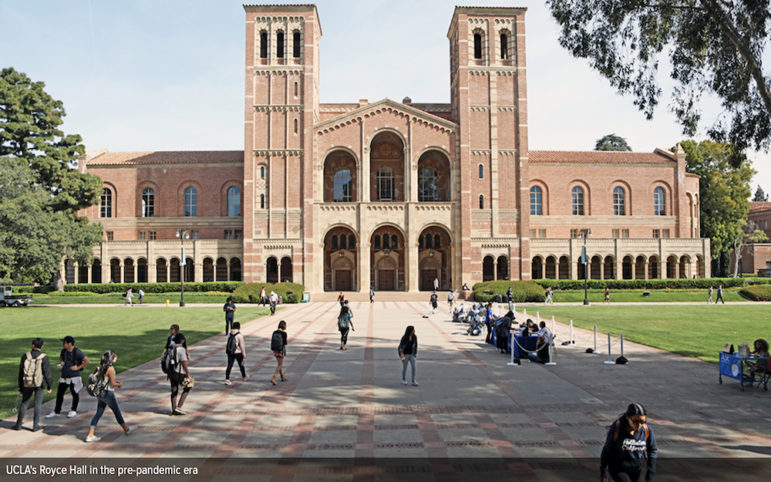For generations, high school seniors have fretted over writing their essays for college applications, worrying how to make their personal stories stand out in the crowd and avoid hurting their acceptance chances with mediocre compositions.
This year’s seniors have even deeper worries as the college application season begins.
Since SAT/ACT scores are optional or totally off the table during the coronavirus pandemic, many colleges say that the personal and academic information presented in applicants’ essays will loom somewhat larger than in the past.
That, in turn, is making some students double down on their essay compositions, often trying to distinguish their pandemic experiences from others stuck in online education and lockdown. In some cases, anxiety is heightened because they are not able to talk face-to-face with counselors and can’t visit drop-in writing centers.
In the past, too many students saw essays as “just another hurdle,” some delaying until final hours or not exerting enough effort. The result, said Timothy Brunold, dean of admission at the University of Southern California in Los Angeles, was “an opportunity unfortunately lost.” At a university that accepted just 16% of nearly 60,000 freshman applicants last year, he now advises hopeful students: “I think that this year of all years, they should pay particular attention to the writing that they submit to colleges.”
DO’S AND DON’TS OF COLLEGE APPLICATION ESSAYS
With deadlines for college applications coming up in the next month or so, here is some advice from college admissions offices and high school counselors about essay writing:
Do’s:
Write in your own voice without adopting a phony academic tone. Schools want to hear about the real you, not your image of what a college student should be.
Mine your own life. Tell stories of challenges and change with concrete examples and descriptions. Entice a reader who has thousands of other applications to review.
Tackle your COVID-19 experience, explaining relevant educational, financial or health issues. But do not allow the pandemic to overwhelm your essay; so many other students have similar tales.

Show that you have researched the college, its programs and history. Explain why you are a good fit there.
Put your essays aside for a few days and return for a fresh look. Show them to another critical eye, not necessarily your parents.
Be sure you actually answer the question asked or prompt posed. Generalized political statements may not fit the bill.
Don’ts:
Don’t plagiarize. Detection by an automated anti-plagiarism program ensures rejection.
Don’t hype or brag too much. If you write that you had the lead in the school musical, be prepared to tell an interviewer later why the production program lists you in the chorus.
Don’t wait until last minute. Even if you work best under the gun, essays need reflection, revision and time. Admissions websites have crashed when overloaded by deadline submissions.

Don’t repeat yourself. Choose topics to show variety and scope. The point is to reveal the person behind the transcript.
Proofread and spellcheck. Nothing turns off a reader more quickly than poor spelling and grammar.
Lauryn Cummins, a senior at Terra Linda High School in San Rafael, has not been able to take the SAT because of virus-related cancellations of testing sessions. As a result, she is “putting a lot more effort than I would otherwise” into writing her essays for applications to University of California campuses and private schools, including Brown University and University of Miami. “I’m spending so much more time on them to make sure they are good.”
Stressful time for students
Most classmates are “stressing so much” as the application deadlines in November and December approach. So, her family and others have hired coaches to help review the statements. Those are her own writing, Cummins said, but her adviser is pushing her to more deeply “reflect on myself and my four years in high school.”
High school grades, class ranks and other quantitative measures of a student’s high school career remain very important in college admissions.
But with SAT or ACT scores optional, colleges’ “decision-making certainly will become a bit more qualitative this year,” said USC’s Brunold. That means more emphasis on how students present themselves in one of the essay possibilities in the nationwide Common Application that USC and many other colleges use and the two to three supplemental statements USC requires depending on majors, he said.
The Common Application’s seven choices for an essay of no more than 650 words include: “Describe a topic, idea, or concept you find so engaging it makes you lose all track of time,” and “Recount a time when you faced a challenge, setback, or failure. How did it affect you, and what did you learn from the experience?” The Common Application this year encourages using an additional section of 250 words to describe how the pandemic affected students.
(USC’s extra essays, each 250 words maximum, are responses to such topics as: “Tell us about a time you were exposed to a new idea or when your beliefs were challenged by another point of view.”)
SAT/ACT scores optional at Santa Clara University, UC
Santa Clara University, a Catholic University in Northern California, made SAT/ACT scores optional this year and next. It requires the Common Application essay and its own supplemental statement, asking: “We strive to cultivate knowledge and faith to build a more humane, just and sustainable world. How do you plan to live out and implement these values in your own life to create a more equitable society?”
Santa Clara always takes a holistic view of applicants, with no single element most important, according to Eva Blanco Masias, vice president for enrollment management. But with no test scores, other parts of the application package, including grades, the essays and letters of recommendation, stand out more. “We focus on what we do have,” she said. “Students’ voices, their personal narratives are going to be important to us,” she said.

The UC system’s nine undergraduate campuses use an application separate from the Common Application. UC requires answers to four of eight so-called Personal Insight Questions (PIQ), with each no more than 350 words. Among the possibilities are: “What would you say is your greatest talent or skill?” and “What have you done to make your school or your community a better place?” There is room for additional explanations, which UC this year says could include “extraordinary circumstances related to COVID-19.”
SAT/ACT scores are optional this year at UC and the university system faces a court challenge, now in appeals court, seeking to ban their use altogether. UC continues to evaluate the 13 remaining factors in its admissions reviews, including high school grades, special talents, honors courses and family circumstances.
Bryan Jue, UC Irvine’s director of marketing and outreach for undergraduate admissions, said this year is “definitely different” without the test scores. UC campuses will put more “emphasis on looking at that context obviously” that students provide in their statements. He urged applicants to use the extra space provided for pandemic explanations, such as schools switching to pass/fail grading, family members falling ill or parents losing jobs. And he said students should take advantage of UC’s free online workshops on statement writing that don’t require expensive private tutors.
Angelina Duran, a senior at the Academy of Scientific Exploration, a public school in San Fernando, near Los Angeles, has attended UC webinars and received counseling help from her school as she applies to several UC campuses and such private universities as Stanford and Duke. But she said she and classmates still feel more anxious about their essays than they would have last year when test scores were required. She took the SAT in March before the pandemic lockdown but was not able to retake it to get a better score, she said.
